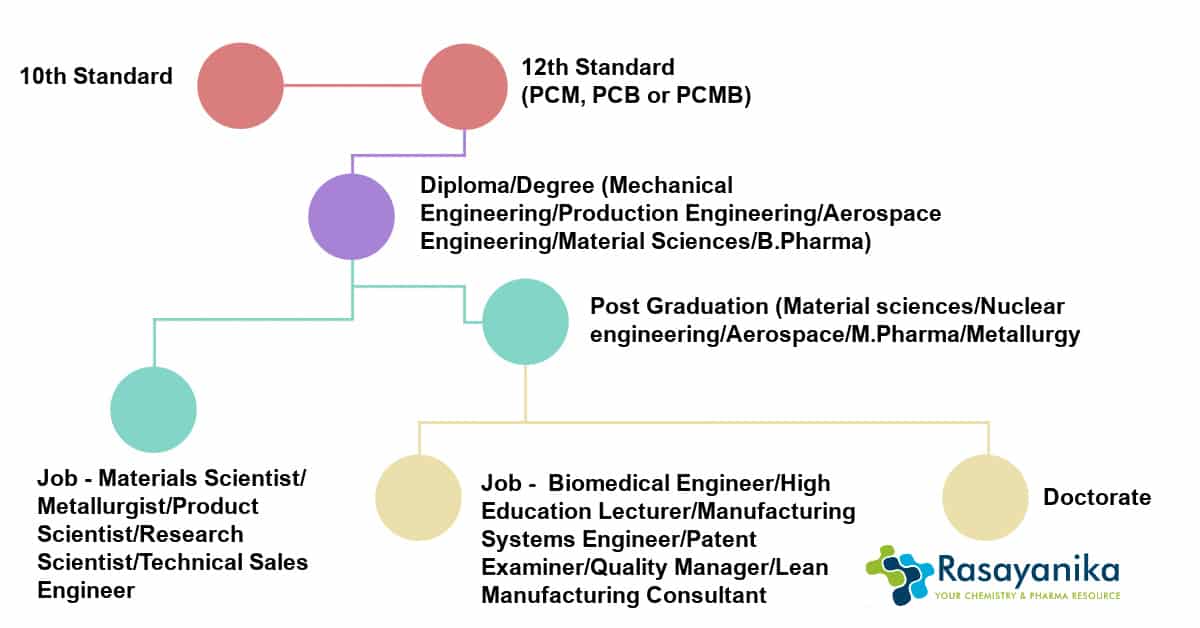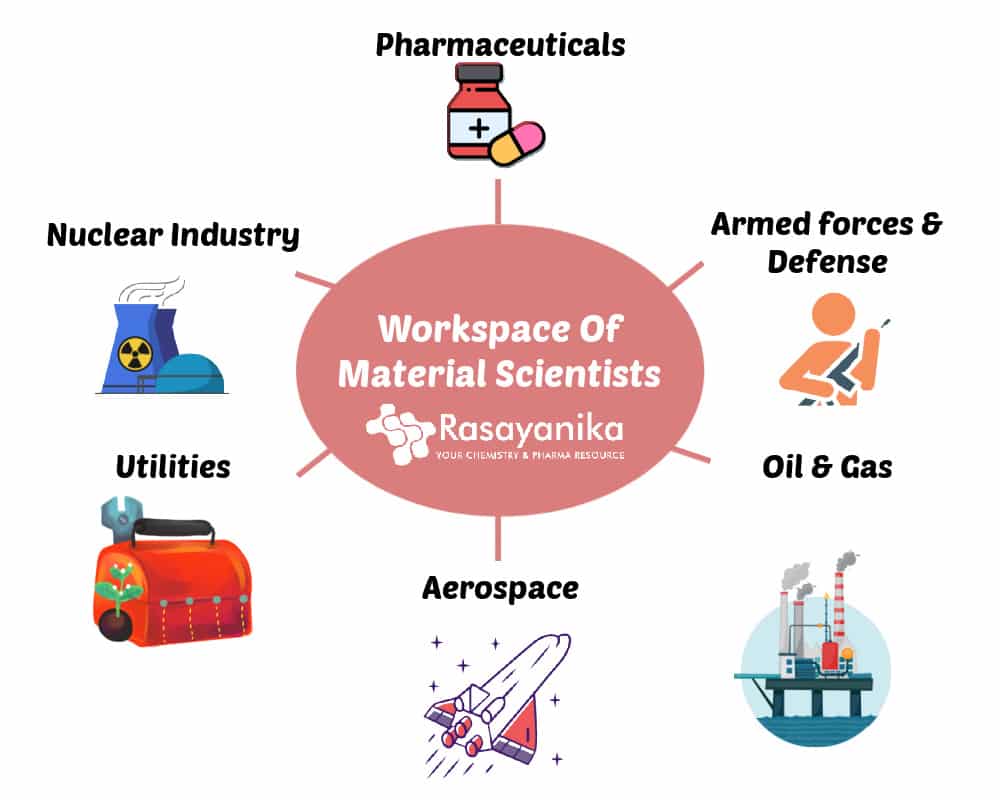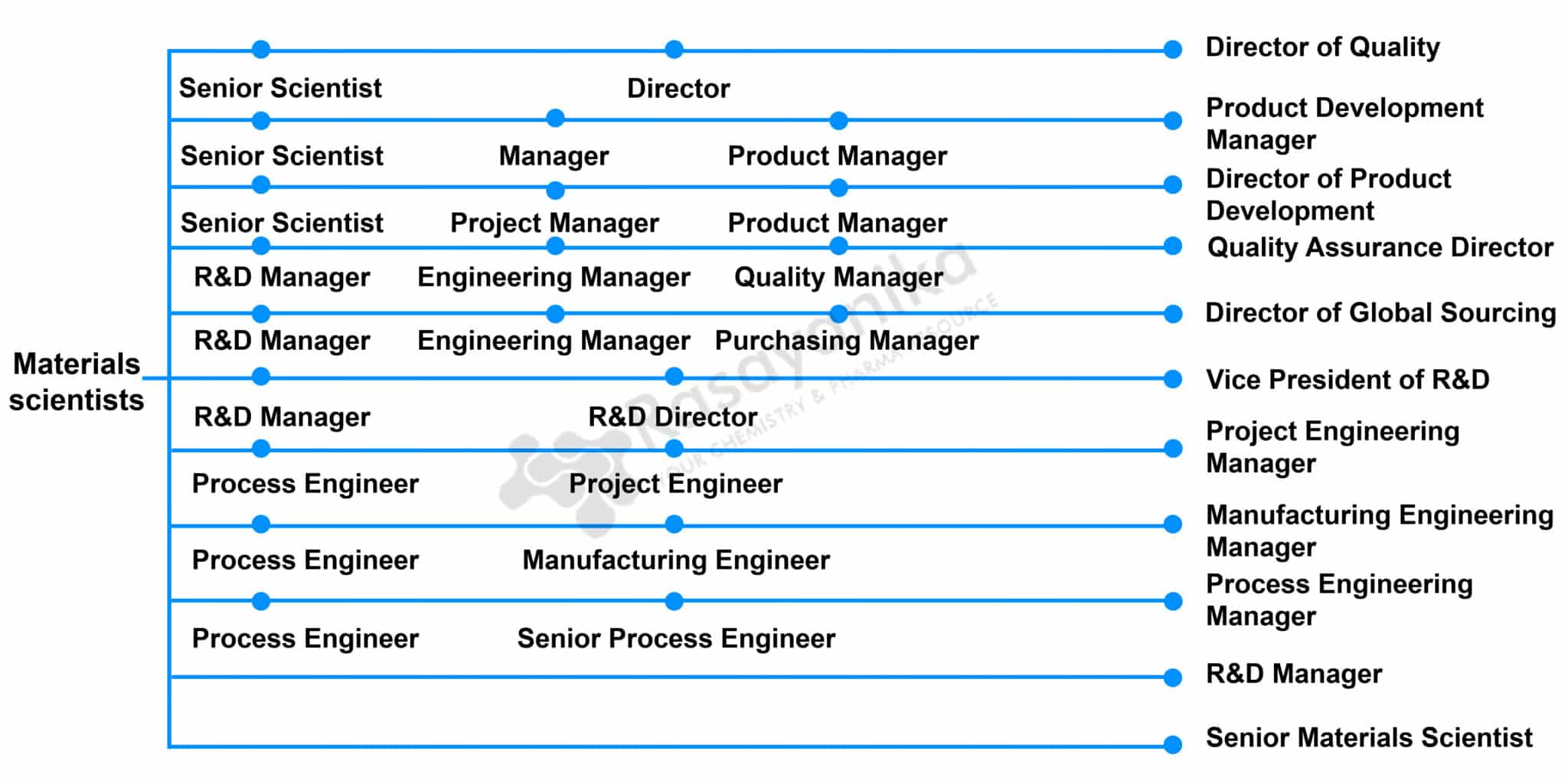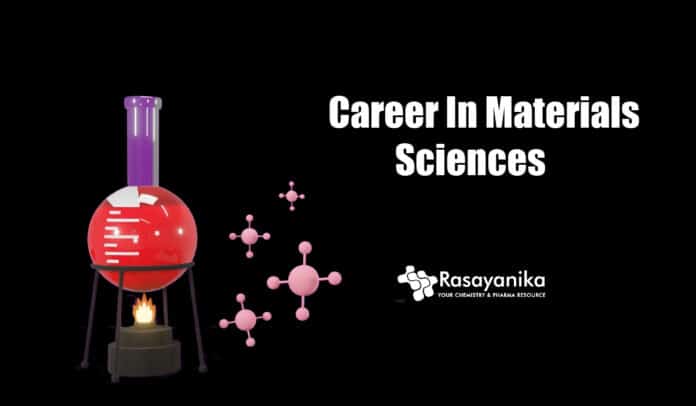Materials Science Career In India
Materials science is comparatively an extensive and new discipline. It comprises applications from numerous scientific fields that contribute to the production of new materials. Chemists serve a principal role within materials science as chemistry offers details regarding the composition & structure of materials and the methods to create & utilize them.
The main concept behind materials science is the association of a material’s microstructure to its macromolecular chemical & physical properties. By discerning and then amending the microstructure, materials scientists modify the properties to produce brand new or custom materials with unique properties for particular purposes.
Materials science is a broad discipline with various other sub-disciplines and applications that individuals who function in this discipline tend to specialize in a material type or technique. Aspirants are recommended to enquire with plastic makers, paints & coatings manufacturers, synthetic rubber makers, and ceramic manufacturers to determine more about all these sectors and opportunities that are present for material chemists in each sector. Scholars and trained individuals pertaining to the discipline of new material design are in endless demand in industries of electronics, biotechnology, energy, and plastics. Moreover, because of the continuous contraction of engineering needs in the
manufacturing units, there are surplus opportunities for the employment of materials scientists in the capacities of professional, scientific, and technical research.![]() What Do You Mean By A Materials Scientist?
What Do You Mean By A Materials Scientist?
A materials scientist is one who explores and assesses the structure and chemical properties of various natural and man-made materials. Metals, polymers, alloys, ceramics, rubber, and glass are all explored and researched to gain or learn new knowledge.
A materials scientist generally performs research on properties and structures of materials to assist in developing new products or improve existing material. They conduct computer modeling and experiments to explore the chemical & physical properties, nature, and structure of metals & their alloys, and their reaction to applied forces. They even ascertain methods to strengthen or combine materials or form new materials to use in other products and applications.
Materials scientists are recruited by firms that create products from rubber, ceramics, and metals. They even work in the biomedical (devising materials for implants & prosthetics) and coatings (producing new kinds of paint) industries. Other pertinent sectors are fuel cells, integrated-circuit chips, graphite materials, superconducting materials, composites, and polymers.
![]() How To Become A Materials Scientist?
How To Become A Materials Scientist?
Materials scientists & chemists require a minimum of bachelor’s degree in chemistry or an allied field. Nonetheless, for many research careers, Ph.D. or master’s degree is required.
I. Educational Requirements

B.Sc. in chemistry or allied field is required for a materials scientist or entry-level chemist jobs. Even though few materials scientists have a degree in materials science, many of them hold a degree in engineering, physics, or chemistry. Several jobs need a Ph.D. or master’s degree and even might need significant years of work experience. Materials scientists and chemists with postdoctoral experience and Ph.D. generally supervise applied or basic research teams.
There are only a handful of programs particularly in materials science, however, numbers are slowly rising. Few colleges present materials science as a specialization in their chemistry programs, and few other engineering schools present programs in the joint field of engineering and materials science. Advanced physical metallurgy, polymeric materials, optical, magnetic, and electrical materials are just a few courses required for a materials science degree.
A major group of material scientists lately suggest training in a more focussed and specific discipline like organic chemistry and inorganic synthesis, or more specifically like ceramic engineering. Apart from scientific training, they emphasize the significance of discerning and being capable of applying fundamental statistical concepts, few others don’t support early specialization.
High schoolers can take computer science, math, chemistry classes for getting admissions in college. Undergraduate students generally need to take courses in physical chemistry, inorganic chemistry, organic chemistry, and analytical chemistry. Besides chemistry coursework, they additionally take classes in physics, biological sciences, and mathematics. Computer science courses are requisite as materials scientists and chemists require computer expertise to conduct simulation & modeling tasks, manipulate & manage databases, and use computerized lab equipment. Lab experience either from university, college, or via work-study programs, fellowships, internships is also beneficial. Graduate fellows majoring in chemistry mostly specialize in subdisciplines like inorganic chemistry or analytical chemistry.
II. Skill Requirements
- Background knowledge: Basic understanding of the properties, composition, and structure of substances.
- Time-management skills: Materials scientists and chemists typically have to meet deadlines when doing research. They should be capable of prioritizing tasks and managing time efficiently while keeping their quality of work.
- Problem-solving skills: Material scientists and chemists explore and devise improved & new materials, processes, and chemical products. This job needs a lot of experimentation by materials scientists and chemists before a novel answer is found.
- Perseverance: Research comprises a considerable amount of trial & error, and materials scientists and chemists should not become discouraged in their work.
- Organizational skills: Materials scientists and chemists require to document procedures scrupulously to conform to industry protocols and regulations. Chaos in the workplace can result in chemical spills, damage to the equipment, and legal problems.
- Math skills: Chemists and materials scientists frequently utilize intricate mathematical formulas and equations, and they require an extensive understanding of mathematics like statistics, algebra, and calculus.
- Interpersonal skills: Material scientists and chemists generally work on interdisciplinary research groups and have to work well with the teammates towards a common mission. Several people play a role as team head and should be able to direct and motivate other team members.
- Critical-thinking skills: Material scientists and chemists scrupulously assess their own work and others’ work. They should find whether conclusions and results are based on proper science.
- Communication skills: Material scientists and chemists have to communicate with scientists and teammates. They should be capable of reading & writing technical reports and giving presentations.
- Analytical skills: Material scientists and chemists conduct scientific studies and experiments. They should be accurate and precise in their evaluations, as errors can invalidate their study.
![]() Best International Institutes For Materials Science
Best International Institutes For Materials Science
| Institution | Country |
| Tsinghua University | China |
| University of Oxford | United Kingdom |
| Nanyang Technological University (NTU) | Singapore |
| Northwestern University | United States |
| National University of Singapore (NUS) | Singapore |
| The University of California, Berkeley (UCB) | United States |
| Imperial College London | United Kingdom |
| University of Cambridge | United Kingdom |
| Stanford University | United States |
| Massachusetts Institute of Technology (MIT) | United States |
![]() Best Indian Institutes For Materials Science
Best Indian Institutes For Materials Science
| Institution | Place |
| Indian Institute of Technology (IIT) | Patna |
| Indian Institute of Technology (IIT) | Hyderabad |
| Indian Institute of Technology (IIT) | Guwahati |
| Indian Institute of Technology (IIT) | Kanpur |
| Indian Institute of Technology (IIT) | Kharagpur |
| National Institute of Technology (NIT) | Calicut |
| Motilal Nehru National Institute of Technology | Allahabad |
| Maulana Azad National Institute of Technology | Bhopal |
![]() Workspace Of Material Scientists
Workspace Of Material Scientists
Few materials scientists mention that one of the enjoyable aspects of their work is being engaged in a project dealing with the initial concept of materials via its productions & marketing. The majority of their tasks are conducted in the laboratory, however, they even work with processing specialists and engineers in manufacturing units and pilot plants. Following commercialization, materials scientists frequently assist customers to modify the materials according to their needs.

A major group of materials scientists is recruited in the industries where products are manufactured, however, few are recruited by academia and government. Others work in computer and electronic industries. Advanced technology nowadays enables these researchers to perform many materials experimental processes with computer & software modeling. Several universities, gas & oil companies, computer manufacturing firms, government organizations, and biotechnological businesses recruit individuals practicing materials science. There are few other evolving & promising fields for materials science graduates such as composites, sustainable materials, biomedical materials, high-performance textiles, nanotechnology, and artificial intelligence. Lastly, there even a few indirect options in the fields of civil services & administration, internet & media, advertising, and finance.
![]() Job Profiles In Materials Science
Job Profiles In Materials Science
A bachelor’s degree can pave a path to different job opportunities in a wide array of sectors offering expertise and knowledge pertaining to the manufacturing, processing, and fabrication of materials. Professions with direct association with the materials science field offer positions like:
- Materials Engineer
- Metallurgist
- Technical Sales Engineer
- Product/Process Development Scientist
- Research Scientist (Physical Sciences)

Apart from this, a degree in material science can offer other indirect roles such as:
- Biomedical Engineer
- Higher Education Professor
- Manufacturing Systems Engineer
- Patent Analyst
- Quality Manager
- Secondary School Lecturer
![]() What Does A Materials Scientist Do?
What Does A Materials Scientist Do?
Materials scientists and chemists explore substances at the molecular and atomic levels and the manner in which materials associate with each other. They employ their expertise to devise ameliorated and new products and to assess the quality of manufactured products. By researching different chemicals and materials, they can ascertain how new materials can ideally improve and serve humanity. Adepts have made several goods that people utilize daily like packaging materials, makeup, containers, canisters, soap, shoes, etc. The main objective of anyone practicing materials science is to explore and understand existing materials to make new ones with ameliorated traits.
Few responsibilities of materials scientists are given below:
- Plan and perform intricate research projects like the manufacture of new products and development of testing processes
- Supervise workers and technicians in analyzing and testing physical properties & components of materials
- Advice and guide technician and scientists on right operating temperatures, mixing times, including ingredients, and testing & chemical processing procedures
- Make reagents, compounds, and solutions used in lab procedures
- Assess substances to ascertain their concentration and composition of elements
- Perform assays on substances and materials to assure that quality and safety standards are fulfilled
- Compose technical reports that explain findings and methods
- Report research outcomes to colleagues, engineers, and scientists
Materials scientists and chemists work in applied research and basic research. Within basic research, chemists study the structure, composition, and properties of matter. They even research with a combination of elements and the pattern in which they associate with each other. In applied research, chemists study possible new goods and methods to ameliorate existing ones.
A major group of materials scientists & chemists work as part of a group. The count of research projects comprising multiple disciplines is rising, and it is common for materials scientists and chemists to work in groups with others like engineers, computer specialists, physicists, biologists, and other scientists.
![]() Salary Structure For Materials Scientists
Salary Structure For Materials Scientists
Graduates can earn around ₹10,000-₹45,000 based on their skill level and capabilities. If you have extra skills in form of tools and software, then emoluments can rise up to 100,000. Post-graduates can earn around ₹30,000-₹300,000. In the case of international jobs, salaries may double especially in continents such as North America and Europe. Freelancers can earn up to ₹25,000-₹500,000 per project depending on its requirements and scope.
 International Professional Organizations For Materials Science
International Professional Organizations For Materials Science
- SAMPE (Society for the Advancement of Material & Process Engineering)
- Materials Research Society
- ASM International
- ACerS (American Ceramic Society)
- ACS Division of PMSE (Polymeric Materials—Science & Engineering)
Check Out Materials Scientists Jobs At Rasayanika















































